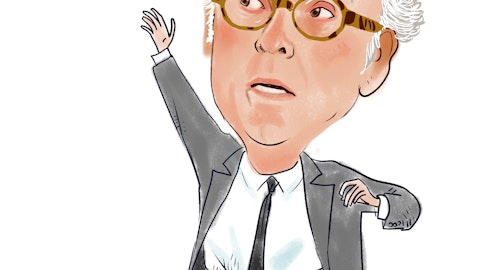It’s hard to predict, but we’re ready to manage this whichever way it goes, and as you can tell, we feel really good about our diversified business mix, where we feel that we have some good resilience in higher skill sets and developing more resilience in also Manpower higher skill sets. We’ll manage it as it evolves based on the trends that we’re seeing, but I’d say the tone in Davos was more optimistic than I had expected.
Mark Marcon: That’s good to hear, thank you.
Operator: Thank you. Our next question is from Kartik Mehta of Northcoast Research. Your line is open.
Kartik Mehta: Thank you. Jack, you talked a little bit about competition and pricing holding up. I’m wondering, is that across all brands? Is maybe the Manpower brand seeing some additional competition because of some of the pressures, and the other brands are holding up? Were you comments kind of overall pricing is holding up? I’m just wondering if you look at the brand, what you think about competition currently.
Jack McGinnis: Yes, thanks Kartik. You know, actually it’s a very good point and I should have clarified that actually Manpower had very good staffing margin improvement in the fourth quarter, so I could understand why there would be a question, if they’re seeing the most pressure on volumes, are they starting to see some pressure on margin, on staffing margin, and that actually is not the case. Despite volumes being down, pricing is holding up very well on the Manpower side, and when we look at that 30 basis points for staffing margin, Manpower was a big contributor to that. No, it’s holding up quite well, and I’d say on the Experis side, margins are holding up very well as well, I think in line with the trends that we’ve talked about in recent quarters. I think the good news is despite some of the pressure we’re seeing in some of the slowing environment, that is not translating into pressure on margins on the Manpower side.
Kartik Mehta: Then Jack and Jonas, all the conversations you’ve had with your clients, and maybe your trip to Davos and Europe, and Jack, just you’re looking at business and the statistics, what would you anticipate for wage inflation? It seems like it’s come down a little bit, but it’s probably mid-single digits – if that’s correct, and I’m wondering kind of your outlook for the year and what you would anticipate for that.
Jonas Prising: You know, as many, we’ve been clearly looking at wage inflation, and just as a reminder, from our perspective, wage inflation is actually a positive effect because it translates into our business through higher bill rates. Our business model is not negatively impacted by the direction inflation or wage inflation, it actually benefits from it. Obviously from an economic perspective, high inflationary pressures are not good, and to your question, we expect wage inflation to continue to come down, as you’ve seen over the last six months, although the pace of that decline is hard to gauge. But I would say this – if you speak, and we speak obviously to employers at large, their expectation is for wage inflation to come down, which is why their wage increases on average are still quite contained, so they are not responding on average to these wage demands, they are trying to manage it through one-time bonuses, hiring incentives, all kinds of one-time effects because their assumption is that wages are going to be coming down over time and they want to remain competitive in the market in their business.
We would expect wage inflation to continue to come down, but based on the gradual and slow decline that we’ve seen certainly over the last nine months, we think there’s still–it’s still going to take a while. But overall, our wage inflation expectations are for it to moderate.
Kartik Mehta: Thank you very much. I really appreciate it.
Operator: Thank you. Our next question is from Tobey Sommer of Truist Securities. Your line is open.





